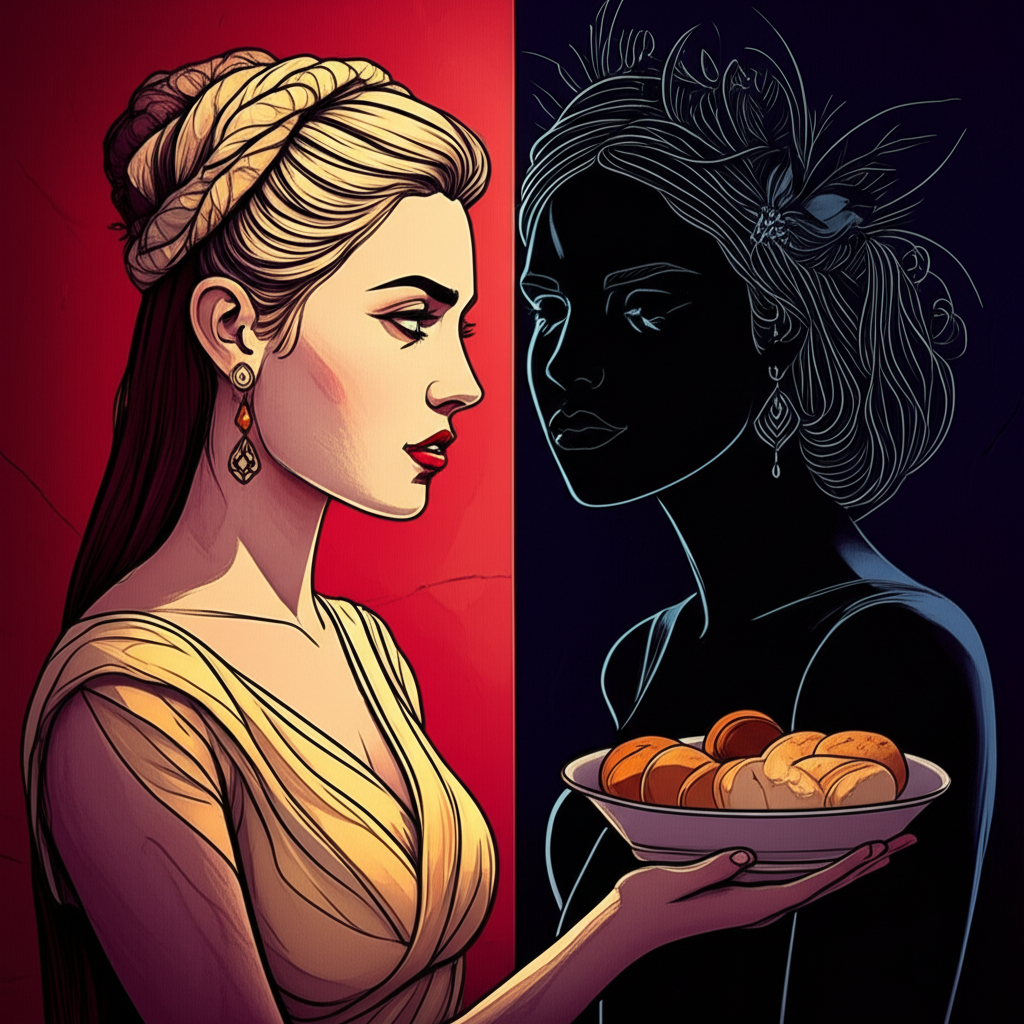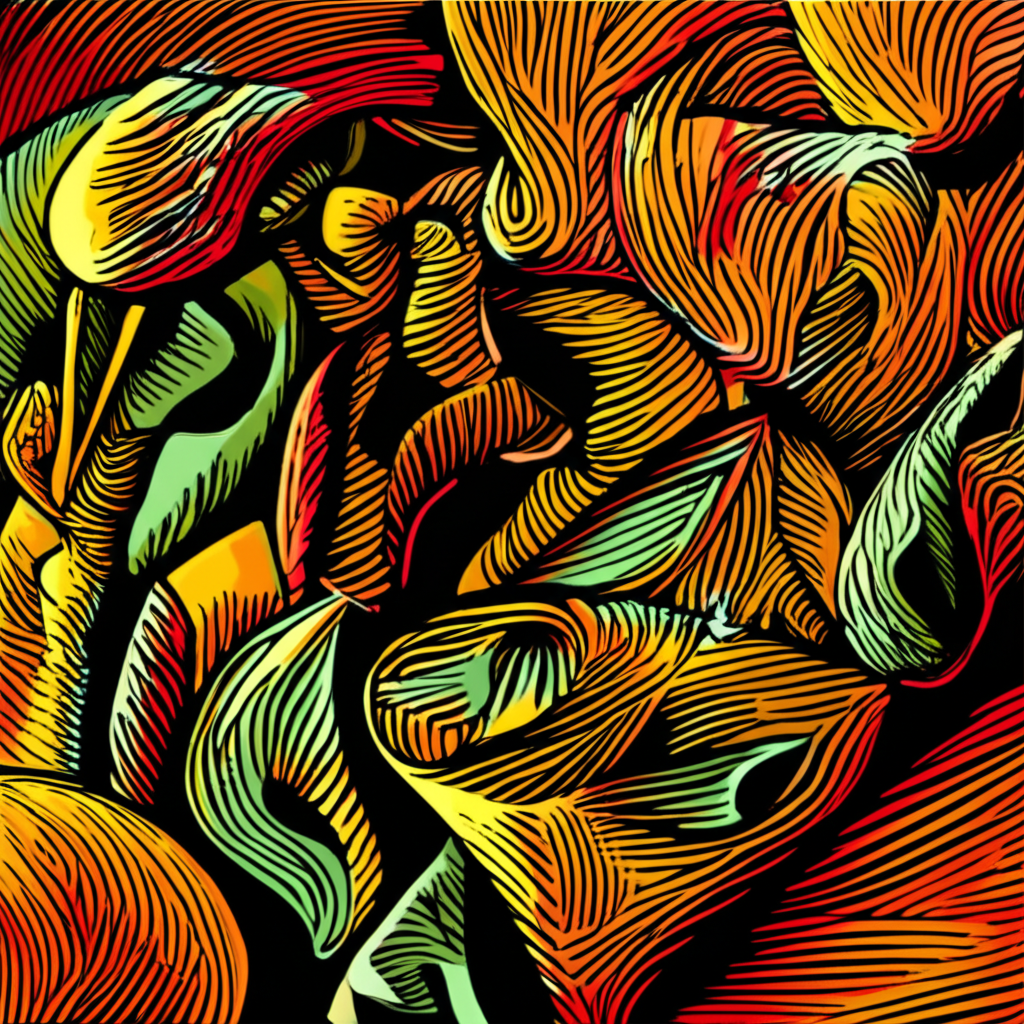Proverbs 9 meaning explained in AI Summary
Chapter 9 concludes the opening section of Proverbs by personifying Wisdom and Folly as women issuing invitations. It's a powerful contrast highlighting the consequences of choosing one path over the other.
Wisdom's Banquet (vv. 1-12):
- Preparation and Invitation (vv. 1-6): Wisdom builds her house, prepares a feast with meat and wine, and sends out her maidens to invite everyone, especially the simple and those lacking understanding.
- The Reward of Wisdom (vv. 7-12): Those who heed Wisdom's call find life, knowledge, and favor with God. They gain understanding and prolong their days.
Folly's Seduction (vv. 13-18):
- Folly's Call (vv. 13-16): Folly, loud and seductive, sits at her door and calls out to those passing by, specifically targeting the naive and those lacking judgment.
- The Trap of Folly (vv. 17-18): Folly offers stolen water (illicit pleasures) and hidden bread (deceptive satisfaction). However, those who indulge don't realize they're on a path to death and destruction.
The Choice (implicit):
The chapter ends without explicitly stating the choice, but the contrast is clear. The reader is left to decide between the life-giving feast of Wisdom and the deceptive allure of Folly.
Key Themes:
- The Importance of Choice: Life is about making choices, and the choices we make have consequences.
- Wisdom's Invitation: Wisdom is readily available to all, but it requires actively seeking and heeding its call.
- The Deceptiveness of Folly: Folly appears enticing but ultimately leads to ruin.
- The Rewards of Wisdom: Choosing wisdom leads to knowledge, understanding, life, and favor with God.
Chapter 9 serves as a powerful reminder to choose wisdom over folly, as this decision will ultimately determine the course of our lives.
Proverbs 9 bible study ai commentary
Proverbs 9 masterfully concludes the book's introductory section (chapters 1-9) by personifying Wisdom and Folly as two women, each hosting a banquet and issuing an invitation. This powerful allegory presents the ultimate choice every person faces: the path of divine Wisdom that leads to life, or the alluring path of Folly that leads to death. The chapter serves as a dramatic and decisive call to commit to God, framing the pursuit of wisdom not as a mere intellectual exercise, but as a life-or-death decision.
Proverbs 9 context
The chapter uses the familiar Ancient Near Eastern imagery of a divine figure (often female, like the goddess Astarte) hosting a feast. However, the author presents Wisdom not as a goddess to be worshipped, but as a personification of a divine attribute emanating from Yahweh. This serves as a powerful polemic, co-opting pagan imagery to subordinate it to the one true God, establishing that true life and substance are found only in Him. The feast metaphor was universally understood as an offer of fellowship, sustenance, and life, making the contrast between Wisdom's nourishing meal and Folly's deadly snack incredibly stark to the original audience.
Proverbs 9:1
Wisdom has built her house; she has hewn out her seven pillars.
In-depth-analysis
- Wisdom (
Chokmoth): The Hebrew is plural, denoting intensity, richness, and the perfection of wisdom. - Has built (
banetah): Wisdom is an active creator and builder. Her work is complete, established, and permanent, unlike the transient allure of Folly. She provides a secure dwelling. - Seven pillars: The number seven in Hebrew culture symbolizes completeness, divine perfection, and wholeness. It suggests Wisdom's house is perfectly designed, divinely ordained, stable, and able to bear great weight. It is a complete worldview and a secure place of refuge.
Bible references
- Matthew 16:18: '...and on this rock I will build my church...' (Christ as the builder of a spiritual house).
- 1 Corinthians 1:30: '...Christ Jesus, who became to us wisdom from God...' (Christ as the personification of divine wisdom).
- 1 Peter 2:5: '...you yourselves like living stones are being built up as a spiritual house...' (The church as the house of God).
Cross references
Eph 2:20-22 (a holy temple in the Lord), Heb 3:3-6 (Christ the faithful builder of his house), Rev 3:12 (a pillar in the temple of God).
Proverbs 9:2
She has slaughtered her beasts; she has mixed her wine; she has also set her table.
In-depth-analysis
- Slaughtered her beasts: This signifies a rich, substantial, and costly feast, not a simple meal. It implies sacrifice and abundant provision for life and sustenance.
- Mixed her wine: This was not dilution with water, but the costly process of adding spices and honey to make the wine more potent and flavorful. It points to the richness and desirability of what wisdom offers.
- Set her table: All preparations are complete. The invitation is not to a future promise but to a present, ready reality.
Bible references
- Isaiah 55:1: 'Come, everyone who thirsts, come to the waters; and he who has no money, come, buy and eat! Come, buy wine and milk without money and without price.' (An open invitation to a divine feast).
- Matthew 22:4: '...Tell those who are invited, See, I have prepared my dinner, my oxen and my fattened cattle are killed, and everything is ready. Come to the wedding feast.' (The King's parable of the great feast).
- John 6:51: 'I am the living bread that came down from heaven. If anyone eats of this bread, he will live forever. And the bread that I will give for the life of the world is my flesh.' (Jesus as the spiritual food).
Cross references
Luke 14:16-17 (Parable of the Great Banquet), Isa 25:6 (A feast of rich food for all peoples), Song 5:1 (the banquet of the beloved).
Proverbs 9:3
She has sent out her young women to call from the highest places in the town,
In-depth-analysis
- Sent out her young women: Wisdom actively seeks the lost and uncommitted. The "young women" are her messengers, carrying her call outward.
- Highest places: She proclaims her message publicly and openly from the most prominent and visible locations. Her call is for all to hear, not a secret or shameful whisper. This contrasts with Folly's secrecy.
Bible references
- Matthew 28:19: 'Go therefore and make disciples of all nations...' (The Great Commission mirrors Wisdom's active sending of messengers).
- Proverbs 1:20-21: 'Wisdom cries aloud in the street, in the markets she raises her voice; at the head of the noisy streets she cries out...' (Wisdom's character is to be public and vocal).
- Romans 10:14-15: '...And how are they to hear without someone preaching? And how are they to preach unless they are sent?' (The necessity of being sent to proclaim the message).
Cross references
Mark 16:15 (Go into all the world), Luke 14:23 (Go out to the highways and hedges), Titus 2:3-4 (older women teaching younger women).
Proverbs 9:4-6
“Whoever is simple, let him turn in here!” To him who lacks sense she says, “Come, eat of my bread and drink of the wine I have mixed. Leave your simple ways, and live, and walk in the way of insight.”
In-depth-analysis
- Whoever is simple (
peti): This refers to the naive, the uninstructed, the one whose will is not yet committed to either good or evil. This is Wisdom's primary target audience—those who can still be taught. - Come, eat... drink: The invitation is to partake of her very substance. This is a call to internalize her teachings, making them one's own spiritual nourishment.
- Leave your simple ways, and live: This is a call to repentance. Accepting Wisdom’s invitation requires a decisive break from a former life of foolishness (
peti). The result is not just existence, but true life (chayah) and a new direction (walk in the way of insight).
Bible references
- Matthew 11:28-29: 'Come to me, all who labor and are heavy laden... Learn from me...' (Jesus' open invitation to the weary to find rest and life).
- John 6:35: 'Jesus said to them, “I am the bread of life; whoever comes to me shall not hunger, and whoever believes in me shall never thirst.”' (Jesus as the direct fulfillment of Wisdom's bread and wine).
- Revelation 22:17: 'The Spirit and the Bride say, “Come.” And let the one who hears say, “Come.” And let the one who is thirsty come; let the one who desires take the water of life without price.' (The final, open invitation of the Bible).
Cross references
Isa 55:1-3 (call to the thirsty), John 7:37 (Jesus' call to the thirsty), 2 Cor 6:17 (come out from them and be separate), Eph 4:22 (put off your old self), Ps 119:104 (hate every false way).
Proverbs 9:7-9
Whoever corrects a scoffer gets himself abuse, and he who reproves a wicked man incurs injury. Do not reprove a scoffer, or he will hate you; reprove a wise man, and he will love you. Give instruction to a wise man, and he will be still wiser; teach a righteous man, and he will increase in learning.
In-depth-analysis
- This section is an interlude that acts as a vital qualification. It explains why some reject Wisdom's open call. It’s a pastoral reality check.
- Scoffer (
letz): The scoffer is not merely simple (peti); he is arrogant, cynical, and hardened in his foolishness. He responds to correction with hate and abuse. - Wise man (
chakam): In contrast, the wise person is defined by their teachability. They value correction because it leads to greater wisdom and insight. Their response is love. - The verses highlight that the state of one's heart—whether teachable or hardened—determines the outcome of hearing Wisdom's call.
Bible references
- Matthew 7:6: '“Do not give dogs what is holy, and do not throw your pearls before pigs, lest they trample them underfoot and turn to attack you.”' (Teaches discernment in sharing sacred truths).
- Proverbs 15:12: 'A scoffer does not love one who reproves him; he will not go to the wise.' (Reinforces the unteachable nature of the scoffer).
- Psalm 141:5: 'Let a righteous man strike me—it is a kindness; let him rebuke me—it is oil for my head; let my head not refuse it.' (The godly perspective on receiving correction).
Cross references
Prov 1:5 (the wise increase learning), Gal 6:1 (restore with gentleness), Amos 5:10 (they hate him who reproves), 2 Tim 4:2 (reprove, rebuke, exhort), Prov 23:9 (do not speak in the hearing of a fool).
Proverbs 9:10-12
The fear of the LORD is the beginning of wisdom, and the knowledge of the Holy One is insight. For by me your days will be multiplied, and years will be added to your life. If you are wise, you are wise for yourself; if you are a scoffer, you alone will bear it.
In-depth-analysis
- The fear of the LORD: This is the foundational thesis of the entire book. It is not sheer terror but a reverential awe, submission, and worshipful recognition of God's supreme authority. This is the starting point (
techillah- beginning, first principle) of all true wisdom. - Knowledge of the Holy One: 'Holy One' (
qedosim) is a majestic plural, referring to the one, transcendentally holy God. True understanding (binah) comes from a personal, relational knowledge of God Himself. - Personal consequence: Verses 11-12 pivot to personal responsibility. The benefits of wisdom (long life) and the consequences of scoffing are ultimately borne by the individual. Your choice affects you above all others.
Bible references
- Job 28:28: 'And he said to man, ‘Behold, the fear of the Lord, that is wisdom, and to turn away from evil is understanding.’” (The identical core teaching).
- Psalm 111:10: 'The fear of the LORD is the beginning of wisdom; all those who practice it have a good understanding.' (A parallel statement from the Psalms).
- Galatians 6:7: 'Do not be deceived: God is not mocked, for whatever one sows, that will he also reap.' (The principle of personal responsibility for one's actions).
Cross references
Prov 1:7 (parallel thesis), Prov 3:1-2 (long life as a benefit), Deut 30:19-20 (choose life), Ecc 12:13 (fear God and keep his commandments), Rom 14:12 (each will give an account of himself to God), Ezek 18:20 (the soul who sins shall die).
Proverbs 9:13-15
The woman Folly is loud; she is seductive and knows nothing. She sits at the door of her house; she takes a seat on the highest places of the town, calling to those who pass by, who are going straight on their way,
In-depth-analysis
- The woman Folly (
Eshet Kesiluth): She is the direct parody and antithesis of Lady Wisdom. - Loud (
homiyyah): She is boisterous, chaotic, and full of empty noise, contrasted with the ordered preparation of Wisdom. - Seductive and knows nothing: This is a damning combination. She is all surface-level appeal and marketing (
pethayyuth- naivety, seduction) with zero substance or knowledge (mah- "what," "anything"). - She sits...: Unlike Wisdom who actively builds and sends, Folly is passive, lazy, and opportunistic. She simply puts herself on display in the same public places as Wisdom, trying to intercept those already on a path ("going straight on their way").
Bible references
- Proverbs 7:11-12: 'She is loud and wayward... now in the street, now in the market, and at every corner she lies in wait.' (The description of the adulterous woman, which Folly personifies).
- Revelation 17:1-2: '...I will show you the judgment of the great prostitute who is seated on many waters, with whom the kings of the earth have committed sexual immorality...' (The imagery of a seductive, corrupting female figure leading nations to ruin).
- 2 Timothy 3:6-7: '...women...who are always learning and never able to arrive at a knowledge of the truth.' (Describes those easily led by desire, lacking a true foundation).
Cross references
Prov 5:3-6 (the forbidden woman), Judg 16:4-21 (Delilah's seduction), Rev 18:2-3 (Babylon the great).
Proverbs 9:16-17
“Whoever is simple, let him turn in here!” And to him who lacks sense she says, “Stolen water is sweet, and food eaten in secret is delicious.”
In-depth-analysis
- Same invitation: Folly targets the exact same audience as Wisdom—the
peti(simple) and the one who lacks sense. The battle is for the uncommitted soul. - Stolen water... food in secret: This is the essence of sin's appeal. The pleasure comes not from the substance (water, food) but from the transgression (stolen, secret). It appeals to the thrill of the forbidden.
- Polemics: "Stolen waters" was a common ancient euphemism for illicit sexual relations, particularly adultery. This directly connects Folly to the adulteress of chapters 5-7 and contrasts her fleeting, shameful pleasure with Wisdom's nourishing, honorable feast.
Bible references
- Proverbs 20:17: 'Bread gained by deceit is sweet to a man, but afterward his mouth will be full of gravel.' (The initial sweetness of sin leads to a bitter, destructive end).
- Hebrews 11:25: 'choosing rather to be mistreated with the people of God than to enjoy the fleeting pleasures of sin.' (Explicitly contrasts godly suffering with the temporary pleasure of sin).
- Genesis 3:6: 'So when the woman saw that the tree was good for food, and that it was a delight to the eyes, and that the tree was to be desired to make one wise, she took of its fruit and ate...' (The original temptation, appealing to desire for what is forbidden).
Cross references
Rom 7:8 (sin, seizing an opportunity, produced covetousness), Prov 5:15 (drink water from your own cistern), James 1:14-15 (lured and enticed by desire).
Proverbs 9:18
But he does not know that the dead are there, that her guests are in the depths of Sheol.
In-depth-analysis
- He does not know: This is the final, tragic ignorance of the one who follows Folly. He is deceived about the true nature of her house and the fate of her guests.
- The dead (
rephaim) are there:Rephaimrefers to the shades, the spirits of the dead. Her house is not a banqueting hall but a mausoleum. Her "guests" are not celebrants but corpses. - Depths of Sheol: Sheol is the Hebrew word for the grave or the shadowy realm of the dead. Folly's invitation doesn't just lead to trouble; it leads to the lowest, most inescapable part of death. The allure of a secret snack ends in ultimate ruin.
Bible references
- Proverbs 2:18: 'For her house sinks down to death, and her paths to the dead...' (The consistent warning about the "strange woman").
- Proverbs 7:27: 'Her house is the way to Sheol, going down to the chambers of death.' (An almost identical warning, showing this is a climactic summary of the theme).
- Romans 6:23: 'For the wages of sin is death, but the free gift of God is eternal life in Christ Jesus our Lord.' (The ultimate biblical contrast between the two paths).
Cross references
Num 16:33 (Korah and company go down alive into Sheol), Matt 7:13 (the wide gate leads to destruction), Eph 5:6 (God's wrath comes on the sons of disobedience), Rev 20:14 (death and Hades thrown into the lake of fire).
Proverbs chapter 9 analysis
- Chiastic Structure: The chapter is built on a sophisticated A-B-A' structure:
- A: The call of Lady Wisdom (vv. 1-6).
- B: An interlude on the wise vs. the scoffer (vv. 7-12). This acts as the hinge, explaining the two possible responses to any spiritual call.
- A': The parallel call of Dame Folly (vv. 13-18).
- Fulfillment in Christ: The New Testament writers implicitly identify Jesus with Lady Wisdom. He is the Wisdom of God (1 Cor 1:24), the builder of the Church (Matt 16:18), the one in whom all treasures of wisdom are hidden (Col 2:3), and the one who offers living water (John 4:10) and the bread of life (John 6:35). The invitation of Wisdom is ultimately His invitation.
- Polemic against Paganism: By presenting Wisdom as a female persona under the authority of Yahweh ("The fear of the LORD..."), the text subverts and repurposes the imagery of Canaanite goddesses. It argues that the life, fertility, and provision sought from these false deities can only truly be found in a relationship with the God of Israel.
- The Battle for the 'Simple': A key insight is that both Wisdom and Folly target the
peti—the simple, naive, and uncommitted. This highlights that spiritual indifference is not a safe, neutral position. The simple stand at a crossroads and will be claimed by one path or the other. Neutrality is not an option.
Proverbs 9 summary
Proverbs 9 presents the climatic choice between life and death through two allegorical invitations. Lady Wisdom proactively builds a secure house and prepares a lavish feast, publicly calling the simple to forsake foolishness and gain life. In stark contrast, Dame Folly, loud yet ignorant, lazily sits and entices passersby with the thrill of "stolen" pleasures. The chapter’s core (v. 10) declares that the "fear of the Lord" is wisdom's foundation. It ends with the grave warning that while Folly's house looks inviting, its guests are the dead, making the choice between the two a matter of eternal consequence.
Proverbs 9 AI Image Audio and Video









Proverbs chapter 9 kjv
- 1 Wisdom hath builded her house, she hath hewn out her seven pillars:
- 2 She hath killed her beasts; she hath mingled her wine; she hath also furnished her table.
- 3 She hath sent forth her maidens: she crieth upon the highest places of the city,
- 4 Whoso is simple, let him turn in hither: as for him that wanteth understanding, she saith to him,
- 5 Come, eat of my bread, and drink of the wine which I have mingled.
- 6 Forsake the foolish, and live; and go in the way of understanding.
- 7 He that reproveth a scorner getteth to himself shame: and he that rebuketh a wicked man getteth himself a blot.
- 8 Reprove not a scorner, lest he hate thee: rebuke a wise man, and he will love thee.
- 9 Give instruction to a wise man, and he will be yet wiser: teach a just man, and he will increase in learning.
- 10 The fear of the LORD is the beginning of wisdom: and the knowledge of the holy is understanding.
- 11 For by me thy days shall be multiplied, and the years of thy life shall be increased.
- 12 If thou be wise, thou shalt be wise for thyself: but if thou scornest, thou alone shalt bear it.
- 13 A foolish woman is clamorous: she is simple, and knoweth nothing.
- 14 For she sitteth at the door of her house, on a seat in the high places of the city,
- 15 To call passengers who go right on their ways:
- 16 Whoso is simple, let him turn in hither: and as for him that wanteth understanding, she saith to him,
- 17 Stolen waters are sweet, and bread eaten in secret is pleasant.
- 18 But he knoweth not that the dead are there; and that her guests are in the depths of hell.
Proverbs chapter 9 nkjv
- 1 Wisdom has built her house, She has hewn out her seven pillars;
- 2 She has slaughtered her meat, She has mixed her wine, She has also furnished her table.
- 3 She has sent out her maidens, She cries out from the highest places of the city,
- 4 "Whoever is simple, let him turn in here!" As for him who lacks understanding, she says to him,
- 5 "Come, eat of my bread And drink of the wine I have mixed.
- 6 Forsake foolishness and live, And go in the way of understanding.
- 7 "He who corrects a scoffer gets shame for himself, And he who rebukes a wicked man only harms himself.
- 8 Do not correct a scoffer, lest he hate you; Rebuke a wise man, and he will love you.
- 9 Give instruction to a wise man, and he will be still wiser; Teach a just man, and he will increase in learning.
- 10 "The fear of the LORD is the beginning of wisdom, And the knowledge of the Holy One is understanding.
- 11 For by me your days will be multiplied, And years of life will be added to you.
- 12 If you are wise, you are wise for yourself, And if you scoff, you will bear it alone."
- 13 A foolish woman is clamorous; She is simple, and knows nothing.
- 14 For she sits at the door of her house, On a seat by the highest places of the city,
- 15 To call to those who pass by, Who go straight on their way:
- 16 "Whoever is simple, let him turn in here"; And as for him who lacks understanding, she says to him,
- 17 "Stolen water is sweet, And bread eaten in secret is pleasant."
- 18 But he does not know that the dead are there, That her guests are in the depths of hell.
Proverbs chapter 9 niv
- 1 Wisdom has built her house; she has set up its seven pillars.
- 2 She has prepared her meat and mixed her wine; she has also set her table.
- 3 She has sent out her servants, and she calls from the highest point of the city,
- 4 "Let all who are simple come to my house!" To those who have no sense she says,
- 5 "Come, eat my food and drink the wine I have mixed.
- 6 Leave your simple ways and you will live; walk in the way of insight."
- 7 Whoever corrects a mocker invites insults; whoever rebukes the wicked incurs abuse.
- 8 Do not rebuke mockers or they will hate you; rebuke the wise and they will love you.
- 9 Instruct the wise and they will be wiser still; teach the righteous and they will add to their learning.
- 10 The fear of the LORD is the beginning of wisdom, and knowledge of the Holy One is understanding.
- 11 For through wisdom your days will be many, and years will be added to your life.
- 12 If you are wise, your wisdom will reward you; if you are a mocker, you alone will suffer.
- 13 Folly is an unruly woman; she is simple and knows nothing.
- 14 She sits at the door of her house, on a seat at the highest point of the city,
- 15 calling out to those who pass by, who go straight on their way,
- 16 "Let all who are simple come to my house!" To those who have no sense she says,
- 17 "Stolen water is sweet; food eaten in secret is delicious!"
- 18 But little do they know that the dead are there, that her guests are deep in the realm of the dead.
Proverbs chapter 9 esv
- 1 Wisdom has built her house; she has hewn her seven pillars.
- 2 She has slaughtered her beasts; she has mixed her wine; she has also set her table.
- 3 She has sent out her young women to call from the highest places in the town,
- 4 "Whoever is simple, let him turn in here!" To him who lacks sense she says,
- 5 "Come, eat of my bread and drink of the wine I have mixed.
- 6 Leave your simple ways, and live, and walk in the way of insight."
- 7 Whoever corrects a scoffer gets himself abuse, and he who reproves a wicked man incurs injury.
- 8 Do not reprove a scoffer, or he will hate you; reprove a wise man, and he will love you.
- 9 Give instruction to a wise man, and he will be still wiser; teach a righteous man, and he will increase in learning.
- 10 The fear of the LORD is the beginning of wisdom, and the knowledge of the Holy One is insight.
- 11 For by me your days will be multiplied, and years will be added to your life.
- 12 If you are wise, you are wise for yourself; if you scoff, you alone will bear it.
- 13 The woman Folly is loud; she is seductive and knows nothing.
- 14 She sits at the door of her house; she takes a seat on the highest places of the town,
- 15 calling to those who pass by, who are going straight on their way,
- 16 "Whoever is simple, let him turn in here!" And to him who lacks sense she says,
- 17 "Stolen water is sweet, and bread eaten in secret is pleasant."
- 18 But he does not know that the dead are there, that her guests are in the depths of Sheol.
Proverbs chapter 9 nlt
- 1 Wisdom has built her house;
she has carved its seven columns. - 2 She has prepared a great banquet,
mixed the wines, and set the table. - 3 She has sent her servants to invite everyone to come.
She calls out from the heights overlooking the city. - 4 "Come in with me," she urges the simple.
To those who lack good judgment, she says, - 5 "Come, eat my food,
and drink the wine I have mixed. - 6 Leave your simple ways behind, and begin to live;
learn to use good judgment." - 7 Anyone who rebukes a mocker will get an insult in return.
Anyone who corrects the wicked will get hurt. - 8 So don't bother correcting mockers;
they will only hate you.
But correct the wise,
and they will love you. - 9 Instruct the wise,
and they will be even wiser.
Teach the righteous,
and they will learn even more. - 10 Fear of the LORD is the foundation of wisdom.
Knowledge of the Holy One results in good judgment. - 11 Wisdom will multiply your days
and add years to your life. - 12 If you become wise, you will be the one to benefit.
If you scorn wisdom, you will be the one to suffer. - 13 The woman named Folly is brash.
She is ignorant and doesn't know it. - 14 She sits in her doorway
on the heights overlooking the city. - 15 She calls out to men going by
who are minding their own business. - 16 "Come in with me," she urges the simple.
To those who lack good judgment, she says, - 17 "Stolen water is refreshing;
food eaten in secret tastes the best!" - 18 But little do they know that the dead are there.
Her guests are in the depths of the grave.
- Bible Book of Proverbs
- 1 The Beginning of Knowledge
- 2 The Value of Wisdom
- 3 Trust in the Lord with All Your Heart
- 4 Father's advice to get Wisdom
- 5 Warning Against Adultery
- 6 Practical Warnings
- 7 Warning Against the Adulteress
- 8 The Blessings of Wisdom
- 9 The Way of Wisdom
- 10 The Proverbs of Solomon
- 11 A false balance is an abomination to the Lord,
- 12 Whoever loves discipline loves knowledge, but he who hates reproof is
- 13 A wise son hears his father's instruction, but a scoffer does not listen to
- 14 Wise Woman builds her house
- 15 A soft Answer turns away Wrath
- 16 God knows the Intent of the Heart
- 17 Better is a dry morsel with quiet than a house full of feasting with
- 18 Whoever isolates himself seeks his own desire; he breaks out against all sound
- 19 Better is a poor person who walks in his integrity than one who is crooked in
- 20 Wine is a mocker, strong drink a brawler, and whoever is led astray by it is
- 21 God judges the Motives of the Heart
- 22 Words of the Wise
- 23 When you sit down to eat with a ruler, observe carefully what is before
- 24 More Sayings of the Wise
- 25 More Proverbs of Solomon
- 26 Like snow in summer or rain in harvest, so honor is not fitting for a
- 27 Do not boast about Tomorrow
- 28 The Wicked Flee when no man pursueth
- 29 He who is often reproved, yet stiffens his neck, will suddenly be broken beyond
- 30 The Words of Agur
- 31 The Words of King Lemuel